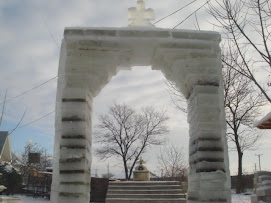 The historian Georges Florovsky has employed the term pseudomorphosis to describe the transformation of Orthodox theology under the impact of influences from the West, particulary in the eighteenth century. In his opinion, these influences served to distord Orthodoxy and obscure its true character. Moreover, some of them became imprinted in Orthodoxy, displacing authentic elements.
The historian Georges Florovsky has employed the term pseudomorphosis to describe the transformation of Orthodox theology under the impact of influences from the West, particulary in the eighteenth century. In his opinion, these influences served to distord Orthodoxy and obscure its true character. Moreover, some of them became imprinted in Orthodoxy, displacing authentic elements.There is certainly a measure of thruth in his severe judgment. But must it also be qualified? For if on the one hand servile imitation and lack of discernment led to a real alienation, above all in the realm of theology as taught in the Orthodox schools and manuals, on the other it must be said that Orthodoxy's encounter with Western spirituality was not without some stimulating effects. This was particulary true in Russia , and in Greece as well.
Tikhon of Zadonsk, whose personality fascinated Dostoevsky, was a typical man of eighteenth-century Russia. This was a Russia traumatized by a brutal westernization imposed from above, wich, at the same time, having been awakened by this shock, was begining to have an awareness of itself and its own vocation in the modern world. A man of a new age, open to Western influences wich he was able to assimilate creatively, St. Tikhon remained firmly rooted in the faith of the Orthodox church and the tradition of the fathers.
 In this respect he points to a syntetis wich appears to be the historic task of the Orthodox church today.
In this respect he points to a syntetis wich appears to be the historic task of the Orthodox church today.Tirelessly preaching in his cathedral and in the churches he visited, he addressed the whole people of God. All persons, all Christians, are called to have a sense of their own dignity as well as that of the least of their brothers. All are bearers of the image of God. Together they are members of the Body of Christ, wich is the church. Following the apostle Paul and John Chrysostom, St. Tikhon insisted on the implication of the vision of the church as the Body of Christ for personal and social ethics : " All men are our brothers because they are created in the image of God, purchased by the blood of Christ, they are called to eternal salvation as members of the one Church."

" When you hear the Gospel it is Christ who speaks to you there, it is you who speak to him."
St. Tikhon sensed divine guidance in the incidents of daily life, in the words of interlocutors, in chance encounters, and above all in his contacts with the poor.
He was to die in absolute poverty, " leaving nothing behind", as his will said- nothing but the testimony of the action of grace and a life painfully fulfilled in doxology:
" Glory be to God for everything ! Glory be to God for having created me in his image and likeness ! Glory be to God for having redeemed me, the fallen ! Glory be to God for having extended his solicitude to me, the unworthy! Glory be to God for having led me, the sinner, to repentance ! Glory be to God for having offered me His holly words, like a lamp in a dark place, thus setting me on the path of righteousness ! Glory be to God for having illumined the eyes of my heart ! Glory be to God for having made known to me His holy name ! Glory be to God for having washed away my sins through the bath of baptism ! Glory be to God for showing me the way to eternal bliss ! The way is Jesus Christ, Son of God, who says of Himself : I am the way and the truth and the life."



